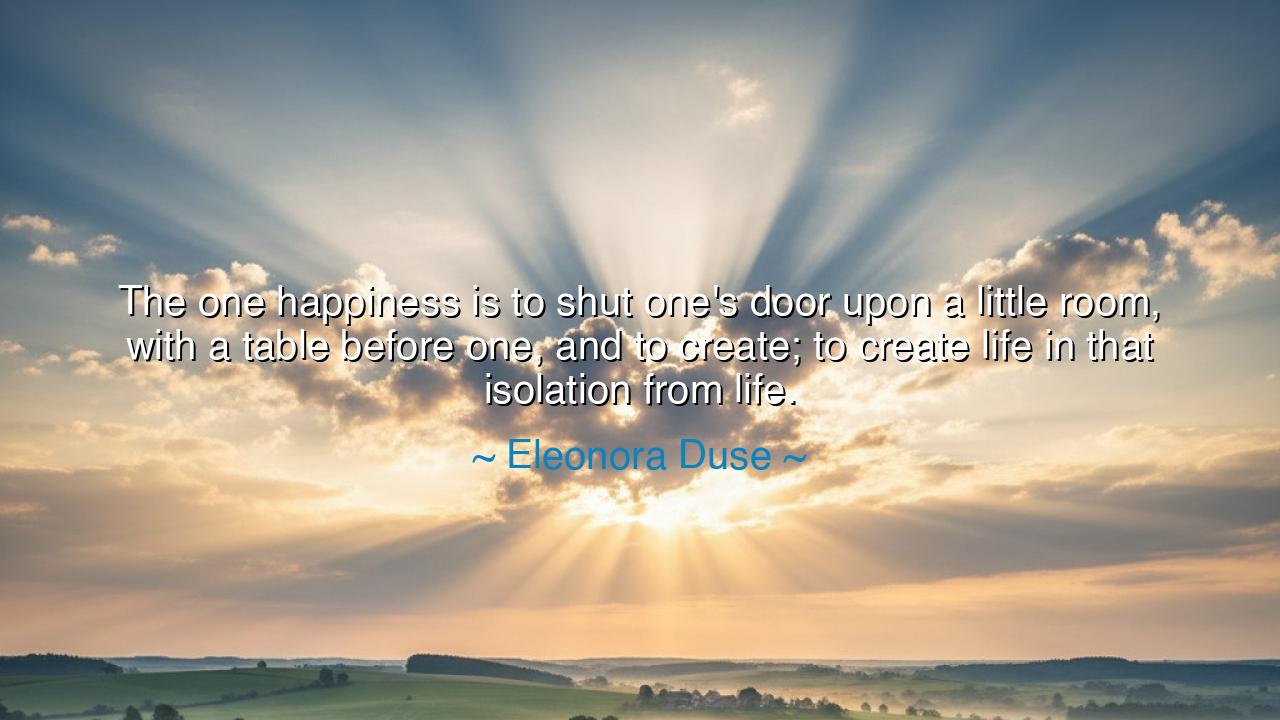
The one happiness is to shut one's door upon a little room, with
The one happiness is to shut one's door upon a little room, with a table before one, and to create; to create life in that isolation from life.






In the words of Eleonora Duse, “The one happiness is to shut one’s door upon a little room, with a table before one, and to create; to create life in that isolation from life.” In this quiet confession lies a truth as profound as it is timeless — that the deepest joy a human soul can know is found not in applause or company, but in the sacred stillness of creation. Duse, one of the greatest actresses to ever grace the stage, speaks here not as a performer bathed in light, but as a seeker retreating into the darkness — into the solitude where art and life merge. Her words reveal the paradox of the artist’s heart: that to bring forth living beauty, one must first withdraw from the noise of the world and listen to the silence within.
The origin of this quote comes from Duse’s reflections on her art and her life, both marked by intensity and introspection. Unlike many of her contemporaries, Duse rejected the vanity of fame; she performed not for the audience’s gaze, but for the truth of the moment. Her retreat into solitude was not an escape, but a return — a descent into the wellspring of her own spirit. In that “little room,” she was not cut off from life, but connected to its essence. There, at her table, she could create not illusions, but life itself — distilled, concentrated, reborn in the quiet fire of imagination.
The ancients understood this divine solitude. The philosopher Plotinus spoke of turning inward to find the “One,” the source of all beauty and creation. The poet Ovid, exiled from Rome, found that in his isolation he could still weave words that outlived the empire that banished him. So too does Duse’s reflection carry the echo of this ancient wisdom: that creation demands both withdrawal and surrender — the courage to close the door on the world’s clamor and the humility to open the inner world instead. For it is there, in the narrow cell of solitude, that the infinite reveals itself.
Consider the story of Leonardo da Vinci, who often locked himself away for days, absorbed in the contemplation of color, motion, and anatomy. To others, his isolation might have seemed loneliness; yet, from that seclusion came the eternal smile of the Mona Lisa — a face that seems to breathe though it is made of paint and silence. Leonardo, like Duse, understood that to create life in isolation from life is not contradiction, but miracle. The artist becomes a vessel through which existence expresses itself anew. What is solitude, then, if not the womb of creation — the still, secret space where thought takes form and the invisible becomes visible?
Duse’s insight also speaks to a universal truth beyond art. Every human being, whether artist or laborer, thinker or dreamer, must sometimes withdraw to find meaning. In a world overflowing with noise, distraction, and endless motion, the act of closing one’s door is a rebellion — an act of self-preservation. To sit alone with one’s thoughts, to work quietly at one’s own table, is to reclaim the sacred rhythm of the soul. In that solitude, one rediscovers the self not as a fragment of society, but as a whole being, capable of reflection, creation, and peace.
Yet this solitude is not selfishness. It is, as Duse suggests, isolation from life for the sake of life. The artist — and indeed, every human spirit — must retreat to renew their strength, to re-enter the world with something new to give. The seed does not grow in the open air; it germinates in the dark earth. So too does creativity require stillness, a darkness out of which light is born. To shut the door is to begin the sacred work of transformation — to turn absence into presence, silence into sound, thought into being.
The lesson, then, is both ancient and eternal: seek solitude, not as escape, but as creation. Make for yourself a little room — it need not be grand, only yours. There, sit with your thoughts, your art, your prayers, or your dreams. Let the world fall away until only your inner voice remains, clear and undisturbed. From that voice, something living will emerge — something that did not exist before, and that could not exist without your quiet labor. In this way, you participate in the divine act of creation itself.
So, O listener, remember the wisdom of Eleonora Duse: happiness lies not in the crowd, but in the chamber of the soul. Shut your door from time to time. Sit at your table. Create — not for recognition, but for revelation. For in that solitude, you will touch the essence of life itself, and discover that to be alone in creation is not to be apart from the world, but to hold it — all of it — in your hands.






AAdministratorAdministrator
Welcome, honored guests. Please leave a comment, we will respond soon